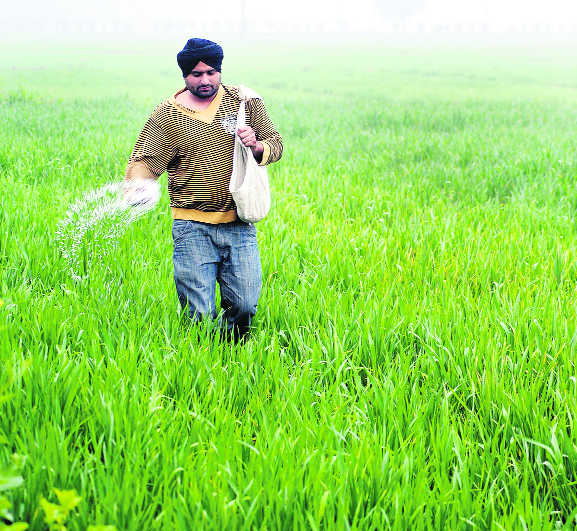
Vibha Sharma
Tribune News Service
New Delhi, August 23
.jpg) “Unscientific” use of NPK (nitrogen, phosphorous, potassium) nutrient ratio has had a “shocking” impact on nutrient elements in the soil and reduced the crop yields in the grain bowl of the country — Punjab.
“Unscientific” use of NPK (nitrogen, phosphorous, potassium) nutrient ratio has had a “shocking” impact on nutrient elements in the soil and reduced the crop yields in the grain bowl of the country — Punjab.
A parliamentary panel report on “National Project of Organic Farming” tabled recently in Parliament says alarming level of 39:9:1 NPK ratio in the key agrarian state against an ideal combination of 4:2:1 and national average of 7:3:1 has resulted in drastic reduction in crop yields over the years.
Quoting from an interaction with Dr Mangala Rai, former secretary, Department of Agriculture Research and Education (DARE), and director general, Indian Council of Agricultural Research (ICAR), the report says the crop yield per kg NPK in Punjab is down to 10 kg from 50 kg in initial years of the Green Revolution.
“The current agricultural yield against the use of one kg of NPK has come down to 10 kg from the earlier 50 kg during the initial years of the Green Revolution (around 1970-71),” says the committee, which studied adverse circumstances of chemical-based farming in India and its cascading effect on soil health, environment and percolation of toxic chemicals in food chain and water bodies.
The findings indicate farmers in order to increase the yields are pumping in more nitrogen and phosphorous into the soil, leading to its further degradation.
In light of serious impacts of chemical fertilisers of soil biodiversity and human health, the panel (Estimates Committee of the Lok Sabha) headed by senior BJP leader Murli Manohar Joshi, has made several recommendations, including building a comprehensive national policy on organic farming. It has also recommended weeding out fake organic products along with stringent punishment for those pushing non-organic produce as organic.
The report quotes Rai as saying the “numbers of nutrient elements deficient in Indian soils are increasing by the year”. “From just one (nitrogen) in 1950 to nine in 2005-06, which is further increasing by the year. Soil fertility studies bring out that available N, P and K are low to medium in 90 per cent, 80 per cent and 50 per cent of the Indian soils. About half of the arable soils are deficient in available zinc.
“The extent of deficiency of available iron, manganese and copper in Indian soils is 12 per cent, five per cent and three per cent, respectively. Continuous use of sulphur-free fertilisers has increased the widespread occurrence of sulphur deficiency in 41 per cent soils. Boron deficiency is widespread in acid and calcareous soils,” Rai adds.
Apart from the need for formulating a comprehensive policy on organic farming instead of pursuing it through “disjointed” programmes unable to achieve envisioned outcomes, the committee also recommended a well-defined strategy to address all related issues. They include availability of organic inputs and green manure along with increasing awareness, standards, research, education, insurance and most importantly financial support and incentives for organic farmers, including better MSP for chemical-free produce.
It recommended setting up a dedicated Organic Finance and Development Corporation, synchronising all schemes related to organic farming along with an increase in budgetary support. The committee also expressed concern over fake organic farm produce entering domestic markets without proper testing and certification. It suggested stringent punishment for those selling non-organic farm produce as organic (chemical pesticide-free) and putting in place a strict monitoring mechanism considering India's potential to boost organic products exports.
The committee suggested increasing public awareness and setting up traditional seed banks to promote organic farming.



























